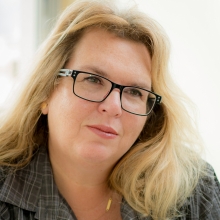A lab of her own
A national initiative to advance Israel’s top female scientists is reaping rewards
Features
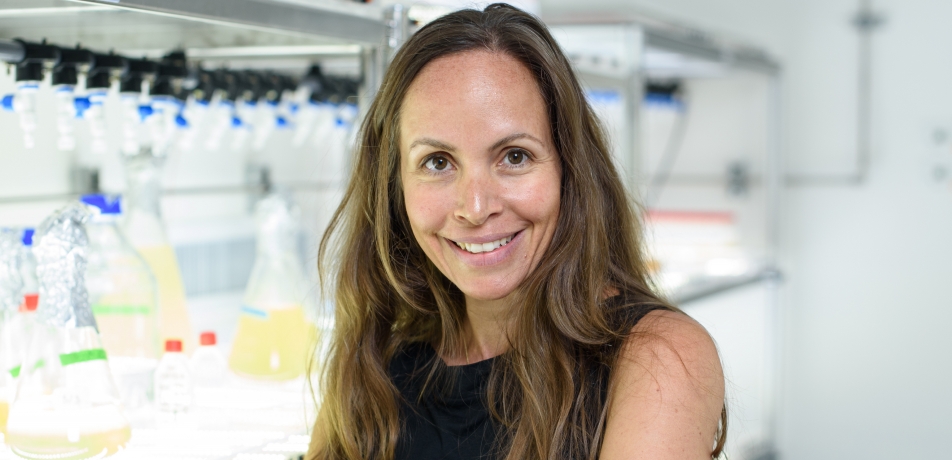
Dr. Einat Segev, a former recipient of the Israel National Postdoctoral Award for Advancing Women in Science. She is a new member of the Department of Plant and Environmental Sciences and one of four new women hired as principal investigators this year who are former grant recipients.
Ten years and going strong, a major Weizmann Institute of Science initiative to advance the careers of women scientists in Israel is having a formidable impact, populating the ranks of Israeli academia with talented women and enriching a multitude of fields.
About 15 years ago, the dearth of women scientists in Israeli academia was becoming evident. While the ranks of women faculty in the U.S. were rising in comparison to men, in percentage terms, Israel was lagging behind. At some Israeli institutions, there were as few as one or two women for every 10 positions. The Weizmann Institute was no exception.
At Weizmann, it was a male faculty member who first brought the issue to the attention of his colleagues. "I have four daughters, and I started to think about their career paths, and then looked at the dismal numbers," says Prof. Yehiam Prior, then the Dean of the Faculty of Chemistry. Half of PhD graduates in the sciences were women—a ratio that has been consistent over time—but few were doing postdoctoral studies abroad, the unwritten prerequisite for attaining a faculty-track position in Israeli academia. As a result, few faculty positions were filled by women.
“We saw that there was a bottleneck, and that making the leap to postdoc studies abroad was it,” he says. “Women should know that a career in science is worth fighting for, and there are excellent women graduates. But we realized that they just needed the financial incentive and encouragement to take this step. Then, the quality of their science would speak for itself.”
So Prof. Prior suggested to Institute leadership that they consider creating a special program that would provide added financial incentive for women to pursue their postdoctoral training abroad. Prof. Daniel Zajfman was about to start his first presidential term, and championed the idea.
Meanwhile, Prof. Hadassa Degani, who was the first President’s Advisor for Advancing Women in Science, appointed in 2002, says that when she assumed that position she was unahappy to see how few women scientists were joining the faculty at the rank of senior scientist—the rank that puts new hires in line for possible tenure—and understood that she must place her focus on expanding the pool of young recruits. The opportunity to do something tangible came in 2005, when Prof. Nirit Dudovich, who just completed her PhD at the Weizmann Institute, was debating whether to do a postdoc fellowship abroad. At Prof. Degani’s recommendation, the Institute decided to offer her a grant to ensure that she would take the leap. The young physicist completed her fellowship in 2007, and went on to become the first woman professor in the Faculty of Physics in the Institute’s history. (At this time, Prof. Degani also obtained an extension of the five-year period between acceptance to the Institute and being submitted for tenure for women who gave birth during this period.)
The Israel National Postdoctoral Award Program for Women in Science was thus born in 2007, just as Prof. Zajfman took over the reins as President. Its aim: to provide added financial incentive for excellent women scientists to pursue their postdoctoral training abroad and thereby give them the leverage they need to compete for faculty-track positions in Israeli academia.
Prof. Zajfman put the program high on his priority list. “I understood that Israel, as a small country with almost no other natural resources except human talent, simply cannot afford this loss of potential brainpower,” he says.
The nationwide, merit-based program, open to women PhD graduates of all educational institutions across Israel, offers monetary grants averaging $40,000 over two years to 10 female recipients every year; some 50 women typically apply annually. There is no requirement for them to take permanent positions offered to them at the Institute or anywhere else. The program alleviates economic difficulties of a two-income family, where the other earner has to put their career on hold and the family must depend solely on the wife’s fellowship income. Since a typical postdoc annual fellowship is low—usually in the range of $40,000-50,000—the award assists in the financial burden of relocation, daycare costs, and living expenses. Since most fellowships are carried out in pricey cities like Boston, New York, San Francisco, and London, the grant is almost a necessity for making ends meet.
With only a handful of institutions of higher education in Israel, the competition for faculty positions is fierce, and employers don’t have to look beyond the top-performing Israelis doing their postdoctoral fellowships at institutions in North America and Europe. The program ensures that women are part of this top-notch cohort.
The program is run today by the current President’s Advisor, Prof. Daniella Goldfarb of the Department of Chemical Physics. “All the candidates are excellent,” says Prof. Goldfarb. “It’s just a matter of determining who is the most outstanding among them.”
Today—a decade in—the program has established itself as a resounding success, which is best measured by the percentage of recipients who have gone on to attain tenure-track positions in Israel: about 69%. To date, 116 women have participated in the program. Of these, 62 have completed the program; the remaining women are in the midst of their fellowships. Of these 62 women, 51 have gone on to lead their own labs—43 of them in Israel.
“The award gives these women an edge in their ability to perform their research—giving them the peace of mind that they can make this leap without it being a big financial risk. It also expresses the fact that we think they are worth investing in, so it gives them a vote of confidence,” says Prof. Goldfarb.“The incongruence in the number of women scientists is not just a problem for women, but for science itself,” says Prof. Zajfman. “Science must be multicultural, and women make their mark and improve science with their own unique perspective— without it, we would be missing a big piece of the puzzle.”
Other program heads have included Prof. Adi Kimchi (Department of Molecular Genetics), and Prof. Varda Rotter (Department of Molecular Cell Biology), who previously held the title of President’s Advisor for Advancing Women in Science.
Immediately after it was launched, the concept of the program resonated with Institute donors worldwide, and from the start it has been fully donor-funded. Its two anchor donors are the Clore Foundation of Israel/UK and the Revson Foundation of the U.S., which together fund eight women annually (see sidebars). Individual Canadian and American donors in particular have been exceptionally generous to the program, thereby sustaining the remaining fellowships.
A deeper talent pool
At the Weizmann Institute alone, the program has had a major positive impact. A decade ago, women comprised only 14% of the Institute’s active faculty; today, the figure stands at 18%. Just this year, five of the 14 new hires are women—an unprecedented percentage. Of those five women, four are former recipients of the postdoc award.
This rise is not the result of affirmative action, the term used in the U.S. for initiatives that would hire women over men if the two candidates were equally qualified. Rather, it is a tribute to these outstanding woman scientists' already significant impact on their chosen fields of research.
“The Weizmann Institute’s hiring policy has always been the same: we hire only on the basis of excellence, and do not fill empty slots but instead find the best possible people in any given field,” says Prof. Zajfman. “This may mean forgoing hiring in a particular area of science for several years in a row, just because we haven’t found a candidate that meets our standards. What the postdoc program does is enable excellent women to invest in their careers, putting them on a more level playing field with their male peers. At Weizmann, we benefit from a bigger pool of incredible talent.”
The challenges faced by women academic researchers are universal, but there are also aspects unique to Israel. Because of mandatory army service, Israeli academics tend to attain their PhDs later in relation to women elsewhere, and graduate at an age that typically coincides with marriage and early childbearing age. During postdoctoral training, husbands and partners must uproot their careers and find new employment abroad, a far more difficult task than, say, an American woman in New York asking her spouse to relocate to Boston. Women may also do a forward-thinking calculation: Scientific careers demand extensive travel to conferences and for collaborations, and there’s no getting around the fact Israel is geographically isolated.
“Israel is a very family-oriented society and it is not always an easy decision for a woman who is starting to have children to uproot herself from her parents and her support system,” Prof. Goldfarb says. Prof. Prior also pointed out that “there is an implicit bias against women scientists and an objective difficulty of being both a scientist and a young mother.”
Dr. Ruth Scherz-Shouval, a former grant recipient who became a principal investigator in the Department of Biomolecular Sciences in 2015 and a mother of three, did her postdoc at the Whitehead Institute for Biomedical Research at MIT. “Practically, the grant provided the financial assistance for us to send our children to better schools and afford a nanny to cover the extra hours that I could not be at home,” she says. Dr. Scherz-Shouval is currently revealing important insights about how cancer cells recruit and subvert normal cells to create an environment that promotes tumor progression and metastasis.
Yet she feels even more can be done. She serves as an informal mentor to female PhD students on campus, and continuously emphasizes “that they should never let lack of confidence stop them from pursuing a career in science.”
The benefit of experience
Prof. Shafrira (Shafi) Goldwasser from the Department of Computer Science and Applied Mathematics, who holds joint appointments at the Weizmann Institute of Science and at MIT, also believes that an important component of promoting women in science is mentoring. “Women scientists and male scientists alike have a responsibility to mentor promising women scientists,” she says.
Prof. Goldwasser says that she sees the postdoc program as having a snowball effect. “More women in science will beget more women in science, and believe that has happened in my field,” she notes. The 2013 A. M. Turing Award winner, Prof. Goldwasser is an inventor of an interactive method for proving theorems while revealing no extra knowledge—a key step in the design of modern cryptographic protocols termed zero-knowledge proofs. This method has had major implications on computer encryption and privacy, an essential component of global telecommunications.
Prof. Maya Schuldiner from the Department of Molecular Genetics, a mother of three, says the most difficult part of the journey for her was overcoming the sense of guilt that she was handicapping her career in science because of her time spent building a family and, at the same time, sacrificing a more fulfilling family life because of her investment in her career. Eventually, she says, “I came to the realization that I couldn’t choose between being either a mother or a scientist; I had to be both. When I made that internal switch, I was much better off.”
She is a major proponent of the postdoctoral program, but, she says, “There is more to do.” And she does more than her share: She participates in a program in which female principal investigators mentor female PhD students, which was initiated by Prof. Adi Kimchi while she served as the President’s Advisor. Mentors and mentees meet once a month to discuss the practical and emotional issues related to being a woman, a mother (or future mother) and a scientist. She believes the program had an impact on her first mentee who decided to pursue a postdoc abroad.
Last year, Prof. Schuldiner, together with Prof. Michal Sharon and Prof. Nirit Dudovich, started a course on combining motherhood and science that is geared toward mothers-to-be: either first-time pregnant women or women who are considering starting a family. The course deals with time management, mapping out goals and needs, how society views working mothers, and role modeling. “I think the most important aspects to this course were sharing tips and ideas on what helped us during challenging times, sharing the difficulties we had along the way, and how we solved them,” says Prof. Schuldiner.
During the postdoc period, Prof. Goldfarb keeps in touch with award recipients, monitoring their advancement and facilitating their hoped-for recruitment into Israeli institutions of higher education.
An outside evaluation of the program in 2015 found the program to be highly effective in its mission. Another sign of success: since the program’s inception, all other Israeli universities and the Israeli Council for Higher Education have initiated similar programs. The women who don’t go into academia go onto successful careers in high-tech or biotech, mostly in Israel—thereby contributing to the Israeli science technology ecosystem.
The Weizmann Institute is the largest contributor of award recipients thus far, having sent 58 women scientists to train abroad. Of the women who have completed their postdoctoral fellowships abroad, the Weizmann Institute has recruited 11 for faculty positions. And the Institute has seen a significant and continuous rise in the number of women faculty members hired in the past 14 years. Within the past five years, women comprise 28% of the new faculty hires.
“This is a very important program. The candidates that apply are the best-of-the-best and that is why so many of them return to academia and are recruited for positions in Israel,” says Prof. Batsheva Kerem from the Department of Genetics at the Hebrew University of Jerusalem, who served on the selection committee.
A new element of the program was introduced last year, called the new Combined Weizmann-Abroad Postdoctoral Program, which funds women scientists to perform postdoctoral research both in Israel and abroad—enabling flexibility for those who have decided a full-length postdoc abroad is not possible. Prof. Schuldiner is a strong believer in this program. She says, “It ensures that we don’t lose fantastic minds just because some women have very real reasons for not being able to do a full postdoc abroad. We cannot lose these women.” In its second year, the program has funded two women, thanks to the generosity of Ellen Merlo of New York, who serves as Chair of the American Committee and leads the committee’s Women for Science initiative.
Our anchor supporters
The Charles H. Revson Foundation has sponsored the fellowships of three women scientists every year since 2009, totaling 25 women to date. “While the program was customized for Israeli women, the issues it addresses are resonant for women scientists around the world,” says Julie Sandor, President of the Charles H. Revson Foundation. “We are convinced that this innovative program could be adapted by any first-rank research institution committed to the retention
of outstanding talent and to lowering the barriers that inhibit the advancement of women in science.”
“Every year at the Charles H. Revson Biomedical Fellows Meeting and Dinner, the staff of the Foundation meets the three first-year Weizmann Revson fellows and renews our acquaintance with the second-year fellows. To a woman, they are not only evidently brilliant scientists, undertaking their postdocs at the most eminent institutions in the U.S., but they share certain personality traits we’ve come to recognize as hallmarks. They have an excitement about their research that is irresistible to even the most casual (and “civilian”) listener. Their hopeful, can-do spirit is infectious. And, despite the fierce demands of their fellowships, they sustain a devoted family life.”
This dinner also serves as a great opportunity for the awardees to meet and network. “We hope they will deepen these bonds over their time in the U.S. and when they return to Israel,” she adds.
The Clore Foundation sponsors five women every two years for a tenure of two years.
Dame Vivien Duffield, Chair of the Clore Foundations in Israel and in the UK, says, “This is a fantastic program, and it is having an effect—there is clear growth in the number of women scientists at the Weizmann Institute.”
Prof. Yehiam Prior is supported by the Mary and Tom Beck-Canadian Center for Alternative Energy Research, the Leona M. and Harry B. Helmsley Charitable Trust, and Dana and Yossie Hollander.
Prof. Nirit Dudovich is supported by the Crown Photonics Center, the Rosa and Emilio Segre Research Award, the Jay Smith and Laura Rapp Laboratory for Research in the Physics of Complex Systems, the Jacques and Charlotte Wolf Research Fund, and The Wolfson Family Charitable Trust. Prof. Dudovich is the incumbent of the Robin Chemers Neustein Professorial Chair.
Prof. Daniella Goldfarb is supported by The Norman E. Alexander Family Foundation, the Park Avenue Charitable Fund, and the Estate of David Turner. Prof. Goldfarb is the incumbent of the Erich Klieger Professorial Chair in Chemical Physics.
Prof. Adi Kimchi is the incumbent of the Helena Rubinstein Professorial Chair in Cancer Research.
Prof. Varda Rotter is supported by The Thomas & Jeanne Elmezzi Private Foundation, Philip Garoon, the Leir Charitable Foundation, and Richard J Pratt. Prof. Rotter is the incumbent of the Norman and Helen Asher Professorial Chair of Cancer Research.
Dr. Ruth Scherz-Shouval is supported by the Comisaroff Family Trust, the Elsie and Marvin Dekelboum Family Foundation, the Peter and Patricia Gruber Awards, The Laura Gurwin Flug Family Fund, Hilda Namm, the Rising Tide Foundation, and the Dr. Zwi & Amelia Steiger Cancer Research Fund. Dr. Scherz-Shouval is the incumbent of the Ernst and Kaethe Ascher Career Development Chair in Life Sciences.
Prof. Maya Schuldiner is supported by the Foundation Adelis, the Berlin Family Foundation, the Rothschild Caesarea Foundation, Roberto and Renata Ruhman, and the University of Michigan. Prof. Schuldiner is the incumbent of the Dr. Gil Omenn and Martha Darling Professorial Chair in Molecular Genetics.
The Advancing Women in Science Program is supported by ACWIS, the Clore Foundation, the Charles H. Revson Foundation, Dr. Daniel C. Andreae, the Edward F. Anixter Family Foundation, Michele Atlin & Earl Levy, the Blythe Brenden-Mann Foundation, the Miriam & Arthur Diamond Charitable Trust, the Dym Family Foundation, Andrea Klepetar Fallek, The Morris Feder Family Philanthropic Fund, The Joseph and Bessie Feinberg Foundation, the Feldman Foundation, Drs. Sonya and Stephen Friedman, the Estate of Sandra L. Gold, Janine Gordon, the Estate of Charlotte P. Graver, the Sidney Greenberg Family Foundation, Carla Hunter, Meryl Jaffe & Adam Hurwich, Arlyn Imberman, Karen Jacobson, Judith Ann Kaplan, Maggie Kaplan, Mr. and Mrs. James F. Kay, the Kittay Foundation Inc., Stuart and Francie Klein, Sisel Klurman, Dr. Bessie F. Lawrence, Debra & Marshall S. Levin, Sir Sydney & Lady Lipworth, the Magellan Corporation, Sonia T. Marschak, Ellen Merlo, Friends of the American Committee’s Midwest Region/Women for Science Luncheon, Peartree Financial and Renee Bleeman, The Perlman Family Foundation, the Estate of Esther Ragosin, the Abraham and Sonia Rochlin Foundation, the Irving and Dorothy Rom Charitable Trust, the Mike Rosenbloom Foundation, the Rowland & Sylvia Schaefer Family Foundation, the Herbert J. Seligmann Charitable Trust, Sunny & Guy Sherman, Marion Silberberg, Dr. Maxine F. Singer, Jory Strosberg, S. Donald Sussman, the TD Bank Group, Ruby & Martin Vogelfanger, Fredda Weiss, Weizmann Canada, Weizmann UK, the Pearl Welinsky Merlo Foundation, and Sharon Zuckerman.
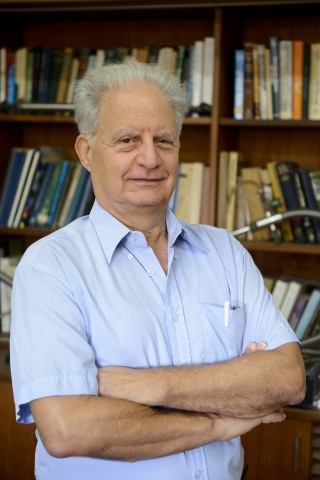
Prof. Yehiam Prior
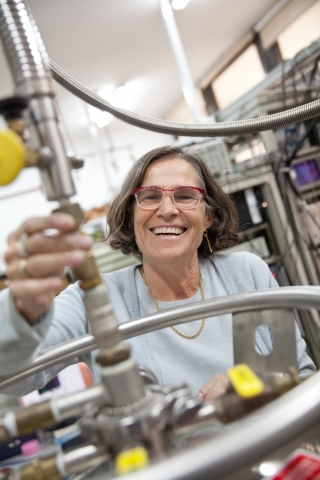
Prof. Daniella Goldfarb
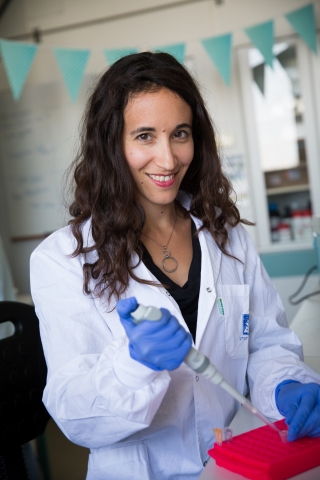
Dr. Ruth Scherz-Shouval

Prof. Shafi Goldwasser: “Women and male scientists alike have a responsibility to mentor promising women scientists.”
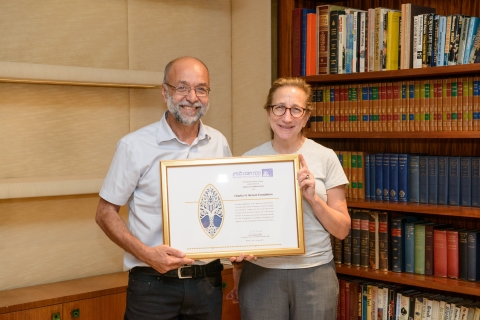
Prof. Israel Bar-Joseph and Julie Sandor
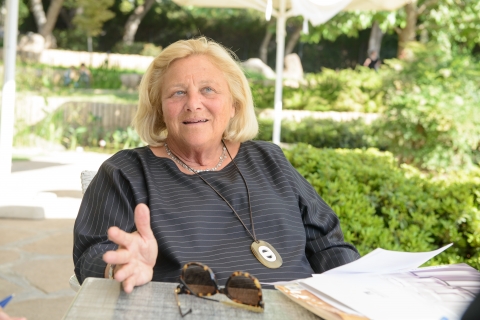
Dame Vivien Duffield



